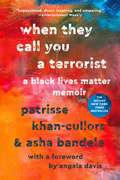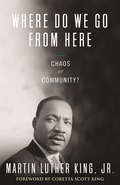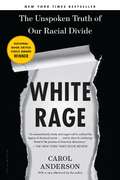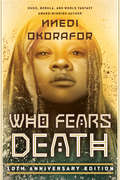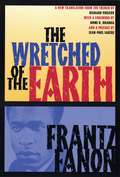Special Collections
Black Liberation Reading List
- Table View
- List View
When They Call You a Terrorist
by Asha Bandele and Angela Davis and Patrisse Khan-CullorsTHE INSTANT NEW YORK TIMES BESTSELLER.
Also: New York Times Editor’s Pick, O, Oprah’s Magazine’s “10 Titles to Pick Up Now,” Entertainment Weekly’s “13 Books to Read in January,” Cassius’ “Black Books to Add to Your Reading List,” Vogue’s “The Most Anticipated Books of January 2018,” Paste’s “10 of the Best Books of January 2018,” Bitch Magazine’s “Bitch Reads: 13 Books Feminists Should Read in January,” ELLE’s “19 of the Best Books to Read This Winter.”
"This remarkable book reveals what inspired Patrisse's visionary and courageous activism and forces us to face the consequence of the choices our nation made when we criminalized a generation. This book is a must-read for all of us." - Michelle Alexander, author of The New Jim Crow
A poetic and powerful memoir about what it means to be a Black woman in America―and the co-founding of a movement that demands justice for all in the land of the free.
Raised by a single mother in an impoverished neighborhood in Los Angeles, Patrisse Khan-Cullors experienced firsthand the prejudice and persecution Black Americans endure at the hands of law enforcement. For Patrisse, the most vulnerable people in the country are Black people. Deliberately and ruthlessly targeted by a criminal justice system serving a white privilege agenda, Black people are subjected to unjustifiable racial profiling and police brutality. In 2013, when Trayvon Martin’s killer went free, Patrisse’s outrage led her to co-found Black Lives Matter with Alicia Garza and Opal Tometi.
Condemned as terrorists and as a threat to America, these loving women founded a hashtag that birthed the movement to demand accountability from the authorities who continually turn a blind eye to the injustices inflicted upon people of Black and Brown skin.
Championing human rights in the face of violent racism, Patrisse is a survivor. She transformed her personal pain into political power, giving voice to a people suffering in equality and a movement fueled by her strength and love to tell the country―and the world―that Black Lives Matter.
When They Call You a Terrorist is Patrisse Khan-Cullors and asha bandele’s reflection on humanity. It is an empowering account of survival, strength and resilience and a call to action to change the culture that declares innocent Black life expendable.
Necessary and timely, Patrisse Cullors’ story asks us to remember that protest in the interest of the most vulnerable comes from love. Leaders of the Black Lives Matter movement have been called terrorists, a threat to America. But in truth, they are loving women whose life experiences have led them to seek justice for those victimized by the powerful. In this meaningful, empowering account of survival, strength, and resilience, Patrisse Cullors and asha bandele seek to change the culture that declares innocent black life expendable.
Where Do We Go from Here
by Martin Luther King Jr. and Coretta Scott King and Vincent HardingIn 1967, Dr. Martin Luther King, Jr., isolated himself from the demands of the civil rights movement, rented a house in Jamaica with no telephone, and labored over his final manuscript. In this prophetic work, which has been unavailable for more than ten years, he lays out his thoughts, plans, and dreams for America's future, including the need for better jobs, higher wages, decent housing, and quality education. With a universal message of hope that continues to resonate, King demanded an end to global suffering, asserting that humankind-for the first time-has the resources and technology to eradicate poverty.
White Rage
by Carol AndersonNational Book Critics Circle Award Winner New York Times Bestseller A New York Times Notable Book of the Year A Washington Post Notable Nonfiction Book of the Year A Boston Globe Best Book of 2016 A Chicago Review of Books Best Nonfiction Book of 2016 From the Civil War to our combustible present, acclaimed historian Carol Anderson reframes our continuing conversation about race, chronicling the powerful forces opposed to black progress in America. As Ferguson, Missouri, erupted in August 2014, and media commentators across the ideological spectrum referred to the angry response of African Americans as "black rage," historian Carol Anderson wrote a remarkable op-ed in The Washington Post suggesting that this was, instead, "white rage at work. With so much attention on the flames," she argued, "everyone had ignored the kindling. " Since 1865 and the passage of the Thirteenth Amendment, every time African Americans have made advances towards full participation in our democracy, white reaction has fueled a deliberate and relentless rollback of their gains. The end of the Civil War and Reconstruction was greeted with the Black Codes and Jim Crow; the Supreme Court's landmark 1954 Brown v. Board of Education decision was met with the shutting down of public schools throughout the South while taxpayer dollars financed segregated white private schools; the Civil Rights Act of 1964 and Voting Rights Act of 1965 triggered a coded but powerful response, the so-called Southern Strategy and the War on Drugs that disenfranchised millions of African Americans while propelling presidents Nixon and Reagan into the White House, and then the election of America's first black President, led to the expression of white rage that has been as relentless as it has been brutal. Carefully linking these and other historical flashpoints when social progress for African Americans was countered by deliberate and cleverly crafted opposition, Anderson pulls back the veil that has long covered actions made in the name of protecting democracy, fiscal responsibility, or protection against fraud, rendering visible the long lineage of white rage. Compelling and dramatic in the unimpeachable history it relates, White Rage will add an important new dimension to the national conversation about race in America.
White Rage
by Carol AndersonFrom the end of the Civil War to our combustible present, an acclaimed historian reframes the conversation about race we must continue to have, chronicling the powerful forces that have long opposed black progress in America.
As Ferguson, Missouri, erupted in August 2014, with media commentators referring to the angry response of African Americans yet again as "black rage," historian Carol Anderson wrote a remarkable op-ed in the Washington Post showing that this was, instead, "white rage" at work. "With so much attention on the flames," she writes, "everyone had ignored the kindling."
Now, in her eloquent and powerfully argued narrative, Anderson makes clear that since 1865 and the passage of the Thirteenth Amendment, every time African Americans have made advances toward full participation in our democracy, white reaction--usually in the courts and legislatures--has fueled a deliberate and relentless rollback of their gains.
The end of the Civil War and Reconstruction was greeted with the Black Codes and Jim Crow.
The Great Migration north was physically opposed in many Southern states, and blacks often found conditions in the North to be no better. The Supreme Court's landmark 1954 Brown v. Board of Education decision was met with the shutting down of public schools throughout the South while taxpayer dollars financed segregated white private schools.
The Civil Rights Act of 1964 and Voting Rights Act of 1965 triggered a coded but powerful response--the so-called Southern Strategy and the War on Drugs that disenfranchised and imprisoned millions of African Americans.
The election of Barack Obama, and the promise it heralded of healing our racial divide, precipitated instead a rash of voter suppression laws in Southern and swing states, while the Supreme Court's decision in Shelby County v. Holder gutted a key provision of the Voting Rights Act.
Carefully linking these and other historical flash points when social progress for African Americans was countered by deliberate and cleverly crafted white opposition, Anderson pulls back the veil that has long covered punitive actions allegedly made in the name of protecting democracy, fiscal responsibility, or protection against fraud.
Compelling and dramatic in the unimpeachable history it relates over a century and a half, White Rage will add an important new dimension to the national conversation about race in America.
A New York Times Bestseller
Who Fears Death
by Nnedi OkoraforInternational award-winning Nnedi Okorafor enters the world of magical realist literature with a powerful story of genocide in the far future and the woman who reshapes her world.
In a post-apocalyptic Africa, the world has changed in many ways, yet in one region genocide between tribes still bloodies the land. A woman who has survived the annihilation of her village and a terrible rape by an enemy general wanders into the desert hoping to die. Instead, she gives birth to an angry baby girl with hair and skin the color of sand. Gripped by the certainty that her daughter is different--special--she names her Onyesonwu, which means "Who fears death?" in an ancient language. It doesn't take long for Onye to understand that she is physically and socially marked by the circumstances of her violent conception.
She is Ewu--a child of rape who is expected to live a life of violence, a half-breed rejected by both tribes. But Onye is not the average Ewu. Even as a child, she manifests the beginnings of a remarkable and unique magic. As she grows, so do her abilities, and during an inadvertent visit to the spirit realm she learns something terrifying: Someone powerful is trying to kill her.
Desperate to elude her would-be murderer and to understand her own nature, she embarks on a journey in which she grapples with nature, tradition, history, true love, and the spiritual mysteries of her culture, and ultimately teaches her why she was given the name she bears: Who Fears Death.
The Wretched of the Earth
by Richard Philcox and Frantz FanonA distinguished psychiatrist from Martinique who took part in the Algerian Nationalist Movement, Frantz Fanon was one of the most important theorists of revolutionary struggle, colonialism, and racial difference in history. Fanon's masterwork is a classic alongside Edward Said's Orientalism or The Autobiography of Malcolm X, and it is now available in a new translation that updates its language for a new generation of readers. The Wretched of the Earth is a brilliant analysis of the psychology of the colonized and their path to liberation. Bearing singular insight into the rage and frustration of colonized peoples, and the role of violence in effecting historical change, the book incisively attacks the twin perils of postindependence colonial politics: the disenfranchisement of the masses by the elites on the one hand, and intertribal and interfaith animosities on the other. Fanon's analysis, a veritable handbook of social reorganization for leaders of emerging nations, has been reflected all too clearly in the corruption and violence that has plagued present-day Africa. The Wretched of the Earth has had a major impact on civil rights, anticolonialism, and black consciousness movements around the world, and this bold new translation by Richard Philcox reaffirms it as a landmark book of the 20th century. Show more Show less
